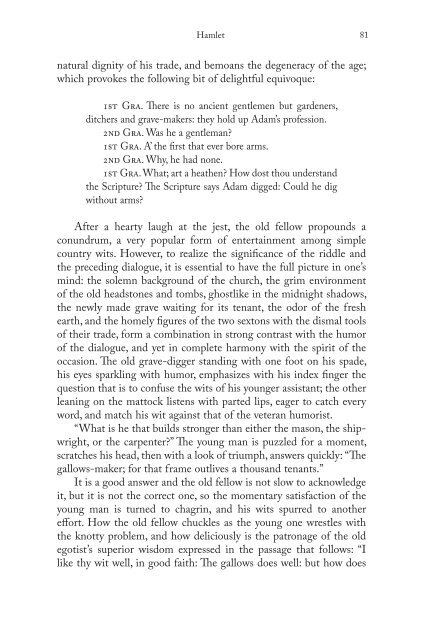Blooms Literary Themes - THE TRICKSTER.pdf - ymerleksi - home
Blooms Literary Themes - THE TRICKSTER.pdf - ymerleksi - home
Blooms Literary Themes - THE TRICKSTER.pdf - ymerleksi - home
Create successful ePaper yourself
Turn your PDF publications into a flip-book with our unique Google optimized e-Paper software.
Hamlet 81<br />
natural dignity of his trade, and bemoans the degeneracy of the age;<br />
which provokes the following bit of delightful equivoque:<br />
1st Gra. Th ere is no ancient gentlemen but gardeners,<br />
ditchers and grave-makers: they hold up Adam’s profession.<br />
2nd Gra. Was he a gentleman?<br />
1st Gra. A’ the fi rst that ever bore arms.<br />
2nd Gra. Why, he had none.<br />
1st Gra. What; art a heathen? How dost thou understand<br />
the Scripture? Th e Scripture says Adam digged: Could he dig<br />
without arms?<br />
After a hearty laugh at the jest, the old fellow propounds a<br />
conundrum, a very popular form of entertainment among simple<br />
country wits. However, to realize the signifi cance of the riddle and<br />
the preceding dialogue, it is essential to have the full picture in one’s<br />
mind: the solemn background of the church, the grim environment<br />
of the old headstones and tombs, ghostlike in the midnight shadows,<br />
the newly made grave waiting for its tenant, the odor of the fresh<br />
earth, and the <strong>home</strong>ly fi gures of the two sextons with the dismal tools<br />
of their trade, form a combination in strong contrast with the humor<br />
of the dialogue, and yet in complete harmony with the spirit of the<br />
occasion. Th e old grave-digger standing with one foot on his spade,<br />
his eyes sparkling with humor, emphasizes with his index fi nger the<br />
question that is to confuse the wits of his younger assistant; the other<br />
leaning on the mattock listens with parted lips, eager to catch every<br />
word, and match his wit against that of the veteran humorist.<br />
“What is he that builds stronger than either the mason, the shipwright,<br />
or the carpenter?” Th e young man is puzzled for a moment,<br />
scratches his head, then with a look of triumph, answers quickly: “Th e<br />
gallows-maker; for that frame outlives a thousand tenants.”<br />
It is a good answer and the old fellow is not slow to acknowledge<br />
it, but it is not the correct one, so the momentary satisfaction of the<br />
young man is turned to chagrin, and his wits spurred to another<br />
eff ort. How the old fellow chuckles as the young one wrestles with<br />
the knotty problem, and how deliciously is the patronage of the old<br />
egotist’s superior wisdom expressed in the passage that follows: “I<br />
like thy wit well, in good faith: Th e gallows does well: but how does

















